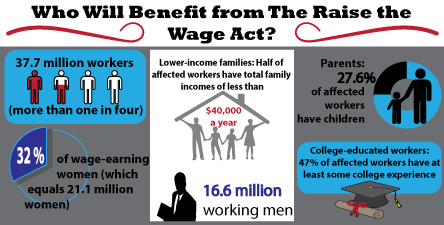
For a single adult, the average monthly expense for housing in Sonoma County is $850, transportation is $285, and food is $242. The hourly living wage is $10.69, according to the Living Wage Calculator.
The total cost of living in Sonoma County is way too expensive for a single adult trying to survive on a federal wage stuck at $7.25 an hour, let alone individuals with dependents to feed.
Despite Congress failure to approve President Obama’s proposal to raise the minimum wage to $10.10 an hour – 29 states, the District of Columbia, and 21 cities and counties have increase their hourly minimum pay rates above the federal standard; and yet, there is still resistance from Congressional Republicans.
As a nation still recovering from the great recession, the fiscal need to raise the minimum wage is evident. Congress last raised the Federal minimum wage in 2009. Since then, the living wage- the wage needed to support the standard of living- has increased and the gap in income inequality continues to grow. To bridge this gap and boost our economy, raising the federal minimum wage is key.
Democrats are undeterred by the lack of Republican votes. Sen. Patty Murray and Rep. Robert Scott seem to be sticking to the old adage, “If you don’t succeed try, try again,” when they proposed the Raise the Wage Act measure calling for a $12 hour raise by 2020.
Why push for the $2 difference?
According to the Economic Policy Institute and the National Employment Law Project (NELP) Fact Sheet, increasing the minimum wage to $12 will provide a raise for 38 million workers, streamline billions into the economy by stimulating consumer spending, start indexing the minimum wage by 2021 to automatically adjust the minimum wage to the cost of living [annually adjust the minimum wage-to-median law ratio], and gradually phase out the subminimum wage [rates below the minimum]. This means that employers will no longer be able to reduce pay based on a tip credit rate that hasn’t changed since 1991.
Critics oppose raising the minimum wage because they are afraid that it will increase the unemployment rate for low-wage workers – especially teens, cause small businesses to suffer and have little to no effect on boosting our economy.
With change comes concession and while these concerns are valid, Republicans have stretched these points to the extreme. As reported by the Department of Labor, 88 percent of those who would benefit from a federal minimum wage increase are age 20 or older. The wage increase will help low-income families rise above the poverty line. A raise in minimum wage will not have a huge impact on teen unemployment rates and as part of a generation nicknamed the “Me, Me” the search for employment is already a struggle.
Threats to small businesses are ever present. Owning a small-business means constant vigilance of economic growth. The American Sustainable Business Council and Business for Fair Minimum Wage polled 555 national small businesses, with two to ninety-nine employees. The report showed 58 percent believe that raising the minimum wage would increase consumer purchasing power.
Big business will take the greatest hits in their profit from minimum wage increases. The NELP reports the 50 largest employers of low-wage workers have largely recovered from the recession and most have the capacity to pay their employees more than a fair wage. Large corporations are also frustrated at having to pay a high cost for low-skill jobs.
Although I am empathetic to the business owner’s plight, the bottom line is, if we want our economy to survive we have to bolster the middle class and increasing the minimum wage will do just that. In fact, researchers found raising the wage increases productivity by increasing motivation and reduces employee turnover.
The idea that raising the minimum wage will have no effect on economic growth is preposterous. Since 1938, Congress has increased the federal minimum wage 22 times. For more than 75 years, real GDP per capita has steadily increased, even when the minimum wage has been raised, according to the Department of Labor. It’s clear that by raising the wage, we will increase consumer spending without adding to state and federal budget deficits.
The fight to crush stagnant wages and income inequality is at hand, whether critics like it to or not. State legislatures and county governments are taking the decision away from Congress by enacting median laws of their own.



Natalie Cortez • Apr 25, 2016 at 10:58 am
I would love the minimum wage to go up cause then living in Sonoma county would be better for me and my 130 coworkers as a whole!